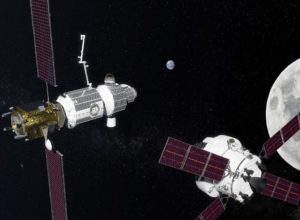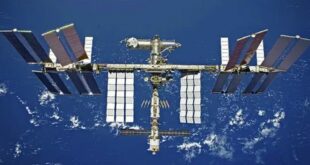
Lunar Orbital Platform – Gateway (LOP-G) is a future international lunar orbiting outpost, planned to be built in the 2020s. We talked about the development of the project, its tasks and goals as well as about Russia’s participation with Oleg Valerievich Kotov, pilot-cosmonaut of the Russian Federation, recipient of the Hero of the Russian Federation medal, veteran of three space missions, currently Deputy Director for Science at the Institute of Biomedical Problems (IMBP) of the Russian Academy of Sciences.
The most important activities on the ISS are extravehicular activity (EVA), material science experiments, plant growing and studying spaceflight effects on the human body. What is the role of science on the LOP-G, and will scientific research be a joint effort of the project partners?
Science will have the same role on the lunar orbiting outpost as it does on the ISS, but there will be fewer experiments. Scientific research on the LOP-G will be carried out by the project partners together. The emphasis will certainly be given to the scientific fields that are impossible to do research in on Earth or on the ISS. The current lunar orbiting scenario includes colonization of the Moon, not just a brief stay.
A comprehensive study of radiation and its effect on humans, equipment and materials (exposure research), big data flow transmission capabilities and navigation studies will be done. As the Moon lacks a magnetic field, the compass, GPS and GLONASS will all be useless on the LOP-G. If we want to build a base on the Moon and travel on its surface, navigation, including computer vision systems, will be vital. But we will need supporting satellite systems too.
Will the crew selection criteria for the LOP-G be any different from the ISS medically and psychologically?

Medicine. The standards of health are determined by the availability of medical care during the flight. A very simple approach is used in low Earth orbit: minor ailments are treated on board the ISS, whereas in case of serious health issues the sick crew member is placed in the capsule and returned to Earth to be treated by medical specialists. In case of the Moon and especially Mars this approach won’t work. Therefore, health requirements will be higher, and more advanced medical equipment, first-aid kits and diagnostic tools will be used as higher autonomy criteria will apply. Various individuals are known to have different levels of radiosensitivity genetically, which will also be in reflected in the selection criteria.
The medical training requirements for crew members will be tougher, and the ground personnel will have to meet advanced medical skill set criteria as well. This means that the support team on Earth will have to be on hand to provide remote medical assistance via telemedicine, which will be more profound and professional than currently on the ISS. This system is currently being developed as part of the Sirius isolation experiments at the Institute of Biomedical Problems in Russia.
Lunar outpost crews are likely to include a surgeon, however, the surgeon might get sick as well, and he or she can’t be a specialist in all areas of medicine. So, telemedicine will play an important role.
Psychology. Living on or near the Moon is not as difficult to handle in this respect as going to Mars since the crews will be in constant communication with Earth, albeit with a slight signal delay, and the home planet is pretty close anyway, enabling crews to return home relatively quickly. In general, the main priority for such missions will be keeping the crews safe and maintaining the option of urgent evacuation. En route to Mars, however, crews ar likely to be suffering from data deprivation, so psychological issues will have to be looked into more seriously as regards missions to the Red Planet.
Therefore, psychological selection criteria for deep space mission candidates will be more rigorous. In addition to that, psychological training, including skills to handle high risk conditions of space missions, will be of great importance.
What role do you think private space companies, both in Russia and globally, will play in the LOP-G project?
The strategy of a space agency (or a corporation) in any nation is the main line for the development of that nation’s space program. And the strategy is implemented through private companies. For example, the Rocket and Space Corporation Energia is formally a private joint-stock company. Most enterprises of our industry are also private companies. This system actually works.
The first stage here is research, the second is homesteading, followed by the third one, which is utilization. Let’s look at the third stage. As soon as a certain new area is up and running, it can be handed over to private companies and the only thing the government does is setting utilization rules. This will work only if there is potential profit to work for. A great example of this is aviation. First, people learned to fly, which was followed by serial aircraft production and setting up various flight routes at different altitudes, and now we are at the stage of airspace utilization: certain rules and laws in aviation and private airlines are free to build airplanes and carry out air transportation based on marketability principles.
In the LOP-G project, national government agencies will be the customers, that is, they will be responsible for coming up with the concept, strategy and developing the project. As for the technical implementation, it will be handed over to private companies. The LOP-G is going to be very similar to the ISS in regard to the workflow. Only trusted and certified companies will be part of the lunar orbiting outpost project (such as SpaceX, a company that provides part of cargo deliveries to the ISS).
As for the workgroups as well as technical, strategic, operational and coordination groups, project managers, technical experts, they will be the same as those involved in the ISS project. So, the LOP-G workflow has been borrowed from the ISS. For example, the ISS power supply and docking group will deal with the same kind of issues in the lunar orbiting outpost project.
Currently, there are no private space companies in Russia that could match SpaceX. They are just not around yet. NASA has been deliberately cultivating such companies by transferring part of the technological developments and issuing state orders to help them grow, enter relevant markets and occupy respective niches.
In your opinion, does this large-scale project have a potential to get the younger generation of engineers and scientists excited about space exploration and encourage them to have a career in the Russian space industry?
Space is always inspiring. Especially, when there are new challenges to meet and new horizons to go to. Yes, it will definitely affect the youth. If you read the list of goals and objectives of the Gateway (LOP-G) project, the second point is activation of scientific and technological development on Earth. Building the station is one task, but running it is something for this planet’s inquisitive young minds to do.
Does the idea of building and inhabiting a crewed outpost in the vicinity of the Moon inspire you? Would you like to go there?
It’s always exciting to be part of a new project, especially of this scale. Any cosmonaut or astronaut would like to have an interesting flight program, and yes, of course, I would like to go to the new outpost. But I do realize the project’s timescale, so I’d prefer to do my best to help make this lunar project a reality from my position here on Earth.
About the interviewer:
Evgeniy Ryzhkov studied space programs for two years in Japan and worked as a technical translator from Japanese at various factories. He is currently an editor and reporter with the ‘Novosti Kosmonavtiki’ magazine.
 SpaceWatch.Global An independent perspective on space
SpaceWatch.Global An independent perspective on space




